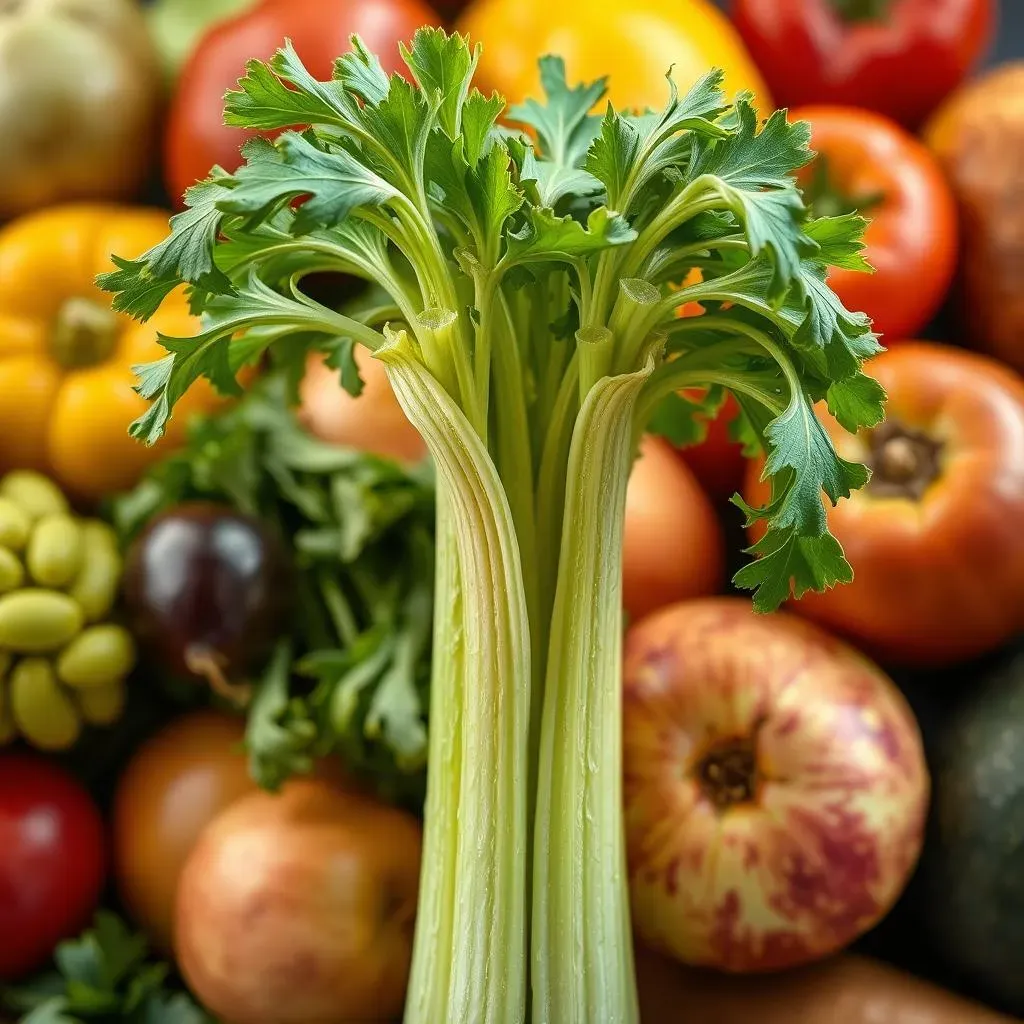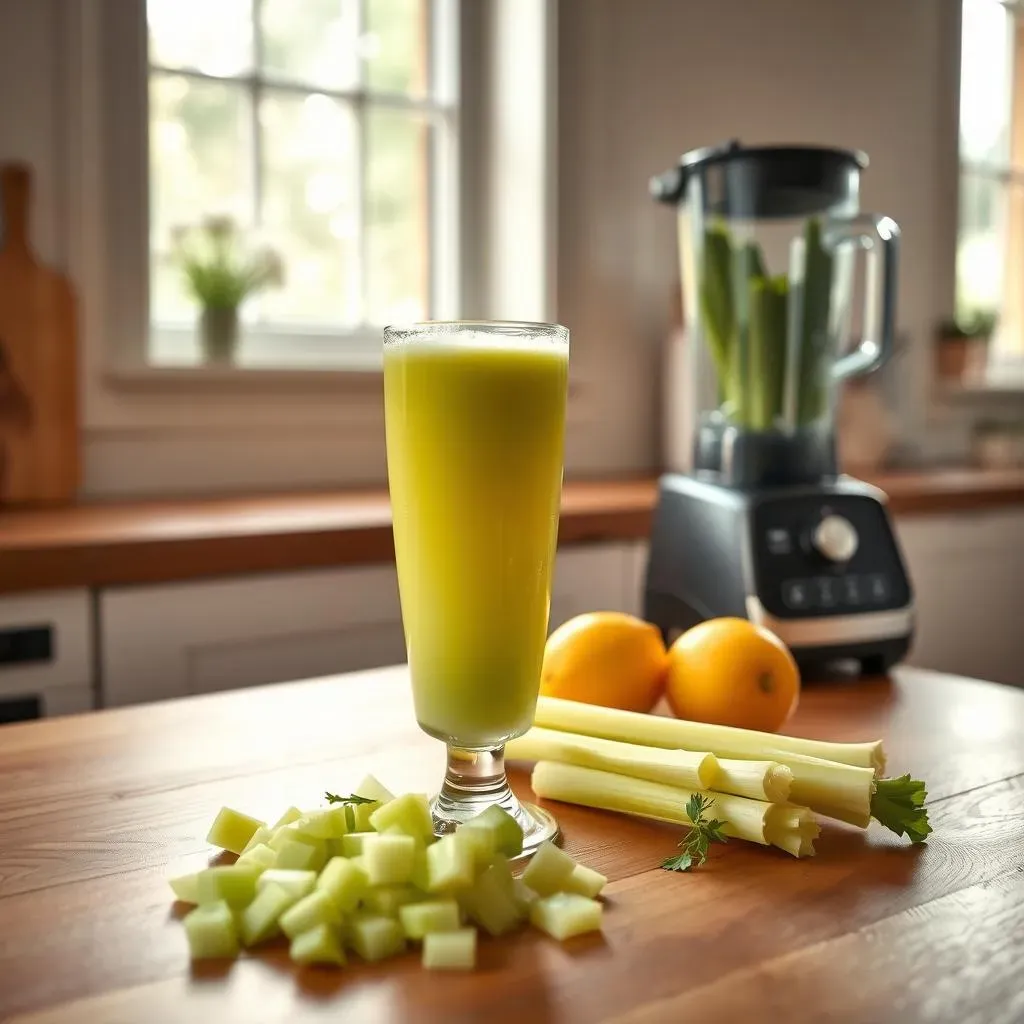Table of Contents
You've probably seen it: vibrant green juice flooding your social media, touted as the ultimate liver detoxifier. Celery juice has taken the wellness world by storm, with claims ranging from miraculous healing to complete body resets. But is there any truth behind the hype, especially when it comes to the liver? We're here to cut through the noise and get real about celery juice and liver detox. This isn't about blindly following trends; it's about understanding what science actually says. In this article, we'll explore the claims about celery juice and liver health, examine the potential risks, and uncover the actual benefits (if any). We'll also show you how to make your own celery juice and look at its nutritional value. Get ready to separate the facts from the fiction – let's get started on this journey to understand the truth behind celery juice and liver detox.
What's the Deal with Celery Juice and Liver Detox?

What's the Deal with Celery Juice and Liver Detox?
Okay, so you've probably seen the hype. Celery juice is everywhere, and folks are claiming it's a magic bullet for liver detox. It's like the new kid on the block in the health world, everyone's trying to get a piece of the action. But here's the thing: our bodies are actually pretty amazing at cleaning themselves. We've got a whole system – the liver, kidneys, even our skin – working together to get rid of the junk. So, when someone says celery juice is going to "detox" your liver, it's worth asking, "Wait a minute, is that even true?" It's not that celery is bad or anything, it's a fine veggie. It's just that the idea of a juice doing a "cleanse" is, frankly, a bit overblown.
Is Celery Juice Safe for Detox? Risks and Concerns

Is Celery Juice Safe for Detox? Risks and Concerns
Okay, let's talk safety. While celery itself isn't toxic, chugging down huge amounts of its juice isn't necessarily a risk-free activity. When you juice celery, you're basically stripping away all the good fiber, which helps with digestion and keeps things moving. What you're left with is a concentrated dose of celery's other compounds, which, in large quantities, could cause some issues. Also, some people might have allergies or sensitivities to celery and not even know it until they suddenly start drinking a lot of celery juice. It's like, you wouldn't eat a whole bushel of celery stalks, right? So why drink the juice of it?
And here's another thing: if you're thinking of replacing meals with just celery juice, that's a big no-no. You're going to miss out on essential nutrients, like protein and healthy fats, which are vital for your body to function properly. This approach can lead to some pretty serious deficiencies and leave you feeling weak and tired. Plus, if you've got any existing kidney problems, the high potassium content in celery juice might be a concern. It's like, your kidneys are already working hard, and you're just throwing more work their way. It's really not a good idea to put your body under that kind of stress just for some supposed "detox." It’s better to just eat a balanced diet and drink water!
Potential Risk | Why It's a Concern |
|---|---|
Nutrient Deficiencies | Replacing meals with only juice lacks protein, healthy fats, and other essential nutrients. |
Digestive Issues | Lack of fiber can lead to constipation or other digestive discomfort. |
Allergic Reactions | Some people may be allergic or sensitive to celery. |
Kidney Problems | High potassium levels in celery juice can be problematic for those with kidney issues. |
Celery Juice: Potential Benefits and What Science Says

Celery Juice: Potential Benefits and What Science Says
The Good Stuff in Celery
Alright, let's not throw the baby out with the bathwater here. Celery isn't all bad, and it does have some good stuff in it. We're talking vitamins, like K and A, and some minerals like potassium. Plus, it's got these things called phytonutrients, which are basically plant compounds that might have some health benefits. Some studies, and I mean *some*, suggest that these phytonutrients could have anti-inflammatory and antimicrobial properties, which is pretty cool. It's like, celery's got a little secret superhero side hustle going on. It's not a cure-all, but it's also not just crunchy water, you know?
Now, when it comes to the big claims about celery juice being a miracle detox for your liver, the science isn't really backing that up. It’s true that some people feel better after drinking it, but that could be because they are drinking more fluids or eating more vegetables, which are always good things. Our bodies are already equipped with a liver and kidneys that do the hard work of filtering out toxins. Celery juice might give these organs a bit of a boost, but it isn’t some magic potion that’s going to overhaul your whole system. It’s like, your body has its own cleaning crew, and celery juice is just a friendly helper, not the whole team.
What Research Really Shows
So, what does the actual research say? Well, there's not a ton of studies specifically on celery juice, and most of them are pretty small. Some research has looked at celery extracts, and they've seen some potential anti-inflammatory and antioxidant effects. That's promising, but it's also not the same thing as drinking a big glass of celery juice. It's like comparing a race car to a bicycle; they both get you from point A to point B, but they're not quite the same. We need more studies, and better studies, to really confirm any of these potential benefits. Right now, the evidence is just not that strong.
And let's be clear, there's no solid proof that celery juice is going to cure chronic illnesses or magically melt away fat. If you're dealing with a serious health issue, you need to talk to a doctor, not rely on some trendy juice. It's better to focus on a balanced diet, regular exercise, and listening to your body. Celery juice can be a part of that, if you like it, but it shouldn't be the main event. Think of it like a side dish, not the whole meal. And honestly, you're probably better off eating the celery whole, so you get all the fiber too. It's like, why throw away the good stuff?
Potential Benefit | Scientific Evidence |
|---|---|
Anti-inflammatory properties | Some studies on celery extracts show promise, but more research is needed on celery juice itself. |
Antimicrobial properties | Limited evidence suggests potential antimicrobial effects from celery compounds. |
Improved hydration | Celery juice can contribute to daily fluid intake. |
Source of vitamins and minerals | Celery contains vitamins K and A, and minerals like potassium. |
Liver Detox | No scientific evidence to prove a detox effect of the liver |
Making Celery Juice: A Simple Guide and Nutritional Facts

Making Celery Juice: A Simple Guide and Nutritional Facts
The Basic Recipe: It's Easier Than You Think
Okay, so you're curious about trying celery juice? It's actually pretty straightforward. You don't need to be a kitchen whiz or have some fancy juicing gadget. All you really need is celery, water, and some way to blend or juice it. I’m not going to lie, you’re going to need a blender or a juicer to get the job done. First, give your celery stalks a good wash to get rid of any dirt or grime. Then, chop them into smaller pieces so they're easier for your blender or juicer to handle. If you're using a blender, you'll need to add a bit of water to help it all mix up. Just blend it until it's smooth, then strain out the pulp using a fine-mesh sieve or cheesecloth. And that's it! You've got yourself a glass of celery juice. It’s super simple, isn't it?
Tips for the Best Celery Juice
Now, let's talk about some tips to make your celery juice even better. For the best flavor, use fresh, organic celery if you can. It just tastes so much better than the stuff that's been sitting around for days. And don't be afraid to experiment a little! Some people like to add a little bit of lemon or ginger to their juice for an extra kick. Just remember, the goal is to make something you actually enjoy drinking, not something you have to force down. I’ve tried adding a bit of apple too, it gives it a nice sweetness. Also, if you're using a blender, you might want to double-strain the juice to make it extra smooth, nobody likes a pulpy juice. It’s all about making it taste good and making the process easy.
Nutritional Breakdown: What's in That Green Drink?
Finally, let’s take a look at what’s actually in a glass of celery juice. It's not exactly packed with calories, which some people like, but that’s also because it doesn’t have a lot of the stuff our bodies need to thrive. You'll get some vitamins, like vitamin K and vitamin A, as well as some minerals, like potassium. But here's the thing: you're also missing out on all the fiber that's in whole celery. Fiber is super important for digestion, so it’s a good idea to have some whole celery too. It’s like, you’re only getting half the picture if you’re only drinking the juice. So, while celery juice can be a part of a healthy diet, it shouldn’t be your only source of nutrients. A varied diet is always the best way to go.
Nutrient | Approximate Amount per 16 oz |
|---|---|
Calories | About 85 |
Vitamin K | High |
Vitamin A | Moderate |
Potassium | Moderate |
Fiber | Low (fiber is removed during juicing) |